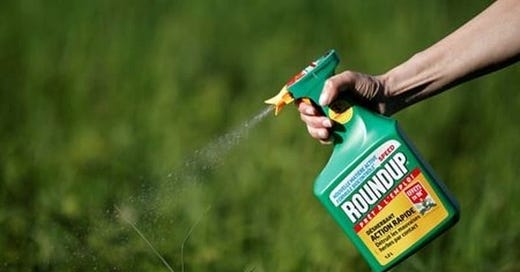When poison pays: Bayer’s $2 billion cancer verdict and the push to outlaw justice
A Georgia man wins big against Roundup’s makers. Bayer responds by trying to rewrite the rules to dodge the next blow.
Last month, a jury in Cobb County, Georgia awarded a man named John Barnes more than $2 billion in compensatory and punitive damages in a lawsuit against Bayer that alleged their Roundup weed killer caused his cancer.
For two decades, Barnes sprayed Roundup — loaded with the herbicide glyphosate — across his property. He trusted the label, trusted the system. Then came the devastating diagnosis: non-Hodgkin lymphoma.
The jury who heard Barnes’ story saw through the smoke: decades of the company rigging data, ghostwriting studies, and burying glyphosate’s risks. They slammed Bayer, which bought Roundup’s maker Monsanto in 2018, with a huge penalty.
You might think that would prompt some soul-searching at Bayer headquarters — maybe pull Roundup off shelves, reassess its safety, launch a PR campaign to mend public trust.
But Bayer decided to double down instead: “We continue to stand fully behind the safety of Roundup products — critical tools farmers rely on to produce affordable food and feed the world,” they declared.
Since 2015, when the World Health Organization labeled glyphosate “probably carcinogenic to humans,” approximately 181,000 claims have targeted Monsanto or Bayer. As of January 2025, Bayer reports that 114,000 of these have been resolved or deemed ineligible. The company has shelled out nearly $11 billion in settlements and reserved $5.9 billion for ongoing litigation, according to their latest annual report.
In spite of the payouts, they continue to deny any wrongdoing.
The lawsuits hinge on a core claim: Bayer failed to warn users about cancer risks. Now, the corporation is pushing a state-by-state campaign to rewrite laws and block future cancer-related lawsuits.
The corporation is lobbying states to pass laws shielding pesticide makers from “failure-to-warn” lawsuits if product labels comply with EPA standards under the Federal Insecticide, Fungicide, and Rodenticide Act (FIFRA). Bills are active in states like Georgia, Iowa, Idaho, Florida, Missouri, Tennessee, and others.
“This isn’t ‘just a label bill,’ as proponents claim,” Bernadette Pajer, the volunteer Tennessee Director of Stand for Health Freedom told the Knoxville Daily Sun. “It’s a corporate shield that slams the door on justice for Tennesseans harmed by pesticides... If pesticide companies are not subject to failure-to-warn claims and claims related to the label, those who suffer injury to themselves or their property have no legal recourse.”
‘Astroturf’ in overalls
Driving through Tennessee recently, the Collapse Life team spotted a highway billboard that nearly made us do a U-turn to double-check what we actually saw: “Stand Up for Glyphosate.” Turns out, the sign was produced by the Modern Ag Alliance, an industry coalition pushing scare tactics that warn food inflation and farmers’ input costs could more than double without glyphosate.
The grassroots-sounding group drapes itself in the language of science, sustainability, and saving the farmer (and by extension, American consumers) by defending "crop protection tools" from pesky regulations that might interfere with profits.
It’s classic ‘astroturfing’ — creating a false impression of a widespread, spontaneously arising, grassroots movement that is, in fact, well orchestrated and financed. In this case, the entire campaign is funded by Bayer. With their help, the alliance is running radio ads and placing billboards in battleground states touting glyphosate as agriculture’s savior and a farmer’s best friend.
On the Alliance’s website, users are urged to encourage state representatives to vote yes on pending bills and support “the folks who grow our food by protecting the availability of safe and essential crop protection tools like glyphosate.”
HB 809/SB 527 would ensure any pesticide registered with the EPA — and sold under a label consistent with the EPA’s own determinations — is sufficient to satisfy requirements for health and safety warnings.
Right before the Cobb County jury handed John Barnes his $2 billion verdict, Georgia lawmakers passed Senate Bill 144 to shield pesticide makers from suits like his. In spite of the internationally acknowledged risks of glyphosate, many American farmers still support its use as “safe and effective” thanks to the many years Monsanto spent greasing the EPA’s gears.
As part of the discovery process during previous litigation, Monsanto had to turn over millions of pages of internal records that reveal how the company used ghostwriters to produce an academic paper published in 2000, which was then used to claim that “independent” scientific literature confirms the herbicide’s safety.
To this day, the EPA still calls it non-carcinogenic, even as juries and researchers stack evidence against it. It’s regulatory capture on steroids. The same folks who sold the poison now dictate who can call it out. If Georgia’s governor signs the new legislation, Barnes’ $2.1 billion win becomes a footnote in history.
Open Secrets reveals that Bayer dropped $8.5 million in lobbying dollars last year, plus millions more at the state level, to ensure the next John Barnes gets $0. This is the typical playbook we see time and time again: Big Pharma, Big Ag, Big Whatever rigs the science, gags the critics, rewrites the rules, and rakes in the profits. We all know it, yet we shrug and let it happen.
But we don’t have to. We can make some noise. We can boycott Bayer. We can support farmers who skip chemicals and make them famous. We can call our lawmakers and demand they kill these immunity bills.
The system’s only untouchable until we quit playing the game. Bayer is banking on our apathy. Let’s prove them wrong.





Excellent work, the harm glyphosate does is incalculable. I am amazed people & farmers still use it 😱
Great artical !!